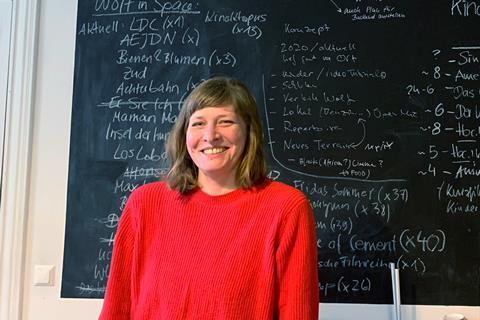The Berlinale programmer and founder of Berlin’s coolest arthouse cinema Wolf Kino reveals the film that opened her eyes to indie film and how Carlo Chatrian helped to balance her life.

Verena von Stackelberg founded Wolf Kino and its VoD platform Wolf In Space in 2017, to support contemporary artistic filmmaking, local talent and provide film education projects. Wolf also has a distribution arm called Steppenwolf that has released titles including Samuel Kishi Leopo’s Berlinale 2020 Generation KPlus title The Wolves. Von Stackelberg previously worked as a film curator and programmer, as well as for organisations including the UK’s Curzon Cinemas and Cambridge Film Festival. She now serves on the Berlinale selection committee.
What is the first thing you do when you arrive in your office each day?
I come to the office twice a week, the rest [of the time] I work from home or for the Berlinale. When I work at the cinema, I turn on the coffee machine. On Mondays, the first thing is always to read the admissions report from the weekend. When we have screening sessions for the Berlinale, I go straight to the screening room in the morning and usually don’t leave until late in the evening.
How has hybrid working impacted your life?
We are all more flexible now. Meeting in person is, of course, irreplaceable but we get a lot done remotely. For the Berlinale, we tend to have regular Zooms.
What was your first job in the film industry?
An usherette at the Curzon Soho cinema in London.
Who do you look up to in the industry?
I was heavily influenced by Tony Jones [co-founder of the UK’s Picturehouse/City Screen arthouse network] and Jason Wood [formerly at Curzon and Home in Manchester, now the BFI’s executive director of public programmes and audiences], in terms of their passion and knowledge. Also Tartan Films and Artificial Eye left a big impact on me. Nowadays, I love the approach to programming of Michelle Carey [International Film Festival Rotterdam] and Carmen Gray [Berlinale’s Generation] — strict but considerate and full of empathy. I also look up to people who have the energy to start something, like my friend Jacqueline Nsiah who is planning a cinema in Accra, Ghana.
What do you like best about your job?
It’s very easy to connect in a deeper way with people through films. Together we reach audiences and broaden horizons.
What was your favourite film growing up?
Gas Food Lodging by Allison Anders was the first really independent film I saw and it made me curious and excited about what film can be. But of course there was also E.T. The Extra-Terrestrial and a whole lot of cheesy 1980s films that I watched many times. My good taste only developed when I left school, moved to Barcelona and discovered the world of independent cinema.
What’s the most impressive answer you have ever had in a job interview?
The most impressive answer I’ve ever received was not directly in an interview but in a review meeting after my first year of working for the Berlinale. It was when [festival artistic director] Carlo Chatrian was very understanding of my position as a single parent. When I said I didn’t think I could hold the Berlinale job next to Wolf and taking care of my son, he asked me, “What do you need from me so you’re able to keep the job?” And we found a way.
What is your favourite festival?
I used to go to Transilvania International Film Festival for many years and always loved how it manages to carefully curate an international programme while promoting Romanian talent.
With whom would you most like to take a meeting?
Tilda Swinton.
What excites you about the future of the business?
Perhaps that, despite continuous challenges, it always reinvents itself and proves that cinema has a fixed place in society.
What is the biggest challenge facing the industry?
Always being alert to new developments, making arthouse/independent films, cinema and festivals attractive to young audiences. And money.
What job would you do if you didn’t work in film?
I would write. Or train horses.
What book are you reading?
My favourite recent book was Girl, Woman, Other by Bernardine Evaristo.
What’s the one TV series everyone should watch this year?
I rarely have the luxury to watch series. There’s always piles of screeners waiting for me.
Who would play you in the biopic of your life and who would direct?
It would have to be a Studio Ghibli film to make it interesting! Although maybe the chair from Suzume could play me?

























No comments yet